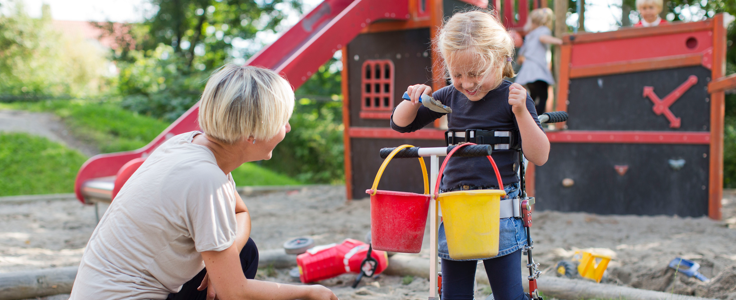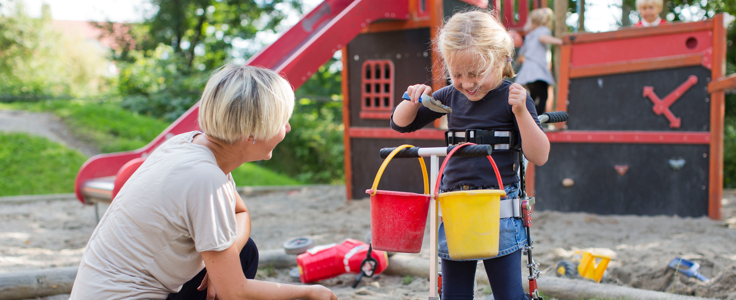Is everything ready for you child’s first day at school or daycare?


The first day of school is a huge milestone in every little boy or girl’s life and something for your family to look forward to.
But if you’re the parent of a child with special needs, as the big day approaches, it’s very common to feel a whole mixture of emotions, both positive and negative. Whilst you are truly excited about your child being able to make their way into the world, it is difficult to ignore some of the worries you have about just how smoothly it will go. It can be very stressful worrying over something that should be a happy occasion.
As you have been at your child’s side every step of the way in their life so far, it is only natural if you have concerns about entrusting the care of your child to the hands of strangers, even experienced professionals.
Perhaps the first thing to remember, is that your child’s school is more than likely used to handling the transition period for new students with different needs. The staff will be experienced in coping with students with special needs, and are well trained to help your child reach their potential, both academically and socially.
We have worked closely with parents, healthcare professionals and therapists for many years to design our helping aids. Over time people have told us about a variety of successful strategies they’ve used, as well as the unexpected issues they weren’t aware of before, when preparing for their son or daughter for the start of school. We wanted to share with you what we’ve learned and give you some practical tips you can put into action. We combined this with our professional knowledge, so you can be sure you can rely on these tried and trusted steps:
Detailed planning is the key
Yes, your child’s school will have procedures in place to manage the process of helping your child adapt to the big change. But that does not mean you have to take a back seat while they take care of everything. There are some things you can do to make the situation a little less stressful.
You are used to planning ahead, and when your child is starting school it is no different. When planning for this, the main areas for you to think about are:
- Learning about the school’s program or routines for children with special needs.
- Can you meet other children on their program?
- Try to arrange a meeting with the parents of other children so you can hear first-hand experiences and advice on overcoming challenges. This can help to reassure you that you won’t be alone on this journey
- Find out the kind of activities your child is likely to be doing day to day, so that you can talk to the them about what to expect in advance.
- Do a test run. You already know you will be pressed for time in the morning, so why not take your family’s new morning routine for a test run. Learning ahead of time how long each bit will take, from waking up to your child’s arrival at school can really reduce your child’s anxiety when you actually have to do it for real.

Communicate effectively with your school
Of course, good planning on your end is not the only thing you should think about. Communicating with the school’s staff is not just about checking the practical details. It’s also about developing a close relationship with the staff. This will help you to build trust and confidence in them.
You should feel comfortable expressing your thoughts to the school, and the school will be better positioned to respond to individual concerns more effectively if they understand you more personally. But what exactly should you discuss with the school, and how? We recommend you think about the following areas:
- What specific information do you need to share with the staff, specifically about your child or their disability? Collect details such as contacts for specialists, different medicines etc for the teachers. Also, you know your child better than anyone, so you can offer insight to help the staff as they get to know your child.
- Start at the top! Begin by arranging a meeting with the principal of the school and your child’s main teachers or carers to address concerns and challenges at the very start.
- Try to meet all the staff who will come into contact with your child if possible, from physios, to occupational therapists, teaching assistants etc. Some familiarity will help all parties adapt quicker.
What about the other children?
Now, we have covered everything the grown-ups should do, but obviously we have not talked about the biggest and most exciting aspect of school - the kids!
Starting school is a wonderful chance for your child to develop in an exciting and positive environment. At heart, young children are just very curious about everything they find in the world; new experiences help them to learn and grow. Starting school is very often the first experience most children will have of meeting another child with a disability.
Chances are that many of the children will want to ask lots of questions in an attempt to understand this new experience. To prepare your child’s interactions with the other students these strategies can be very helpful:
- Remember that kids are very caring. They simply want to find ways to help and understand
- Young children like to ask lots and lots of questions! Be prepared for this and try to think of some appropriate answers ahead of time
- Try to discuss with the teachers the best way to explain things to the other children, such as the best way to talk about why your child needs certain types of equipment or extra help sometimes.
- Give your child lots of positive reinforcement about their school experience and new friends.
And, last but not least, maybe the most important thing of all: remember that nobody is perfect, but everybody is trying their best. There will probably be some minor bumps in the road, but by working together, this is nothing you, your child or the school can’t handle with confidence!

The author worked as Head of Marketing for Made for Movement for 7 years before she pursued other adventures in her own company. Trine Roald has over 20 years of international experience within a variety of industries. As Head of Marketing for Made for Movement she was passionate about communicating stories and know-how featuring possibilities for improving the quality of life among people with severe disabilities.
In this blog, we take you on a deep dive into universal design so you can understand and recognize how these principles are...
A disability entails the loss of, damage to, or deviation from bodily or psychological functions, in the form of mental, physical,...
Epilepsy is a serious neurological brain disorder that causes recurring seizures and is common in children with cerebral palsy. There...
Hear from us from time to time and learn new things

